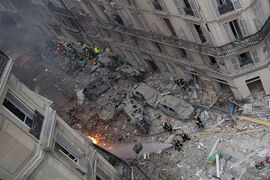Assassination of Michael Meilke: Difference between revisions
No edit summary |
No edit summary |
||
| Line 40: | Line 40: | ||
}} | }} | ||
On March 19, 2000, at 14:47 p.m., [[Prime Minister of Mascylla|Michael Meilke]], the [[Prime Minister of Mascylla| | On March 19, 2000, at 14:47 p.m., [[Prime Minister of Mascylla|Michael Meilke]], the [[Prime Minister of Mascylla|19th Prime Minister of Mascylla]], was {{wp|assassination|assassinated}} by the explosion of a {{wp|pipe bomb}} reinforcing a {{wp|land mine}} as he was returning to his parking {{wp|limousine}} after a visit to a public {{wp|gymnasium}} in Lannbrück, [[Mascylla]]. The explosive devices were hidden in a {{wp|mailbox}} and under a {{wp|sewer cover}} respectively, in front of the gymnasium. The approaching limousine drove over the cover, triggering the mine, as the pipe bomb detonated to reinforce the entire explosion. The narrow street of the bombing site further amplified the shock wave, instantly killing Meilke, his four agents, his driver, a policeman and seven students and onlookers. Another 91 were injured, 40 of them had lost a body part, suffering a permanent {{wp|disability}}. | ||
Confusion erupted at first whether Meilke survived the assassination or not, with numerous rescue personnel confirming they had seen him breathing. When he was delivered to Lannbrück University Hospital, he appeared to have punctured lungs, lost his right leg and have suffered severe brain trauma. He was pronounced dead fifteen minutes after the bombing. None of his agents or staff survived the assassination; agent Franz Obenknecht survived with serious injuries but died a day later due to internal bleeding. | Confusion erupted at first whether Meilke survived the assassination or not, with numerous rescue personnel confirming they had seen him breathing. When he was delivered to Lannbrück University Hospital, he appeared to have punctured lungs, lost his right leg and have suffered severe brain trauma. He was pronounced dead fifteen minutes after the bombing. None of his agents or staff survived the assassination; agent Franz Obenknecht survived with serious injuries but died a day later due to internal bleeding. | ||
Revision as of 15:41, 7 August 2020
| Assassination of Michael Meilke | |
|---|---|
 Rescue teams and firefighters arrive at the site of the explosion in front of the gymnasium; the bombs were located on the left sidewalk of the alley (leaving a shallow crater where the fire is)
| |
| Location | Lannbrück, Mascylla |
| Date | March 19, 2000; 20 years ago 14:37 p.m. |
| Target | Michael Meilke |
Attack type | Bombing |
| Weapons | Land mine, additional pipe bomb for explosion reinforcement |
| Deaths | 14 (including Michael Meilke) |
Non-fatal injuries | 91 (40 disabled) |
| Perpetrators | Heinrich Glöcker |
On March 19, 2000, at 14:47 p.m., Michael Meilke, the 19th Prime Minister of Mascylla, was assassinated by the explosion of a pipe bomb reinforcing a land mine as he was returning to his parking limousine after a visit to a public gymnasium in Lannbrück, Mascylla. The explosive devices were hidden in a mailbox and under a sewer cover respectively, in front of the gymnasium. The approaching limousine drove over the cover, triggering the mine, as the pipe bomb detonated to reinforce the entire explosion. The narrow street of the bombing site further amplified the shock wave, instantly killing Meilke, his four agents, his driver, a policeman and seven students and onlookers. Another 91 were injured, 40 of them had lost a body part, suffering a permanent disability.
Confusion erupted at first whether Meilke survived the assassination or not, with numerous rescue personnel confirming they had seen him breathing. When he was delivered to Lannbrück University Hospital, he appeared to have punctured lungs, lost his right leg and have suffered severe brain trauma. He was pronounced dead fifteen minutes after the bombing. None of his agents or staff survived the assassination; agent Franz Obenknecht survived with serious injuries but died a day later due to internal bleeding.
The Imperial Police quickly released images of the suspected perpetrator, who was later identified as Heinrich Glöcker, a museum curator and right-wing extremist. After the bombing, he had a shootout with local police forces and fled with a stolen car, presumably to a storage facility in Lübbernau. He reappeared in Lannbrück on March 22 with a suicide bomb vest, taking a public transport bus hostage and threatening to trigger his bomb for 54 minutes while police struggled to negotiate a release. Upon realizing his contraption had a design flaw that didn't allow it to explode, he committed suicide by shooting himself.
Meilke was the second Prime Minister to die in office and be the victim of an assassination. No formal invocation of succession by a government official took place, although Deputy Prime Minister Konrad Folln assumed the office upon Meilke's death. Subsequent investigations were not able to identify any other individuals or organizations involved with the planning and execution, but stated that it "can not entirely rule out the possibility of a bigger conspiracy or plot at play"; numerous journalists and officials have rejected and put forward doubts as to whether he acted alone. The lack of a motive behind the bombing, due to the death of the perpretator and the lacking evidence suggesting a manifest or motive, has led many to theorize a possible plot or cover-up by a terrorist organization, other foreign parties, or the government itself. The assassination is widely debated and has spawned a variety of books, reports, and conspiracy theories.